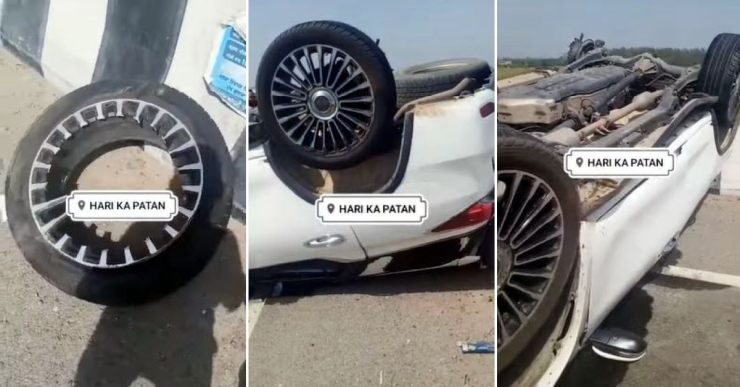In today’s trend, many car owners, especially those with SUVs, are opting for large-sized alloy wheels. However, these wheels are not typically offered by original equipment manufacturers (OEMs), so people often purchase them from aftermarket shops. In the video provided, we can see the aftermath of a massive accident involving a Toyota Fortuner, which was caused by aftermarket alloy wheels.
The video depicts a Toyota Fortuner that has overturned, with a shattered alloy wheel strewn by the side of the road. The reason for the wheel’s damage is not explicitly mentioned in the video. However, it appears that the Fortuner was equipped with aftermarket, larger-sized alloy wheels, and one of them broke, causing the SUV to roll over six times before coming to rest upside-down on the road. It is possible that the wheel failed when the SUV hit a pothole, resulting in the rollover. Notably, the video reveals that the centre part of the alloy wheel is missing.
Also read: Mahindra Thar vs Toyota Fortuner show off-road capabilities
The installation of aftermarket alloy wheels can cause issues

Cracked rims: The alloy wheels offered by OEMs are subjected to rigorous testing and are made of high-quality materials. As a result, they are less likely to crack when encountering potholes. OEMs invest significant resources in research and development to ensure the durability of their alloy wheels. In contrast, aftermarket wheels may be of inferior quality, which can make them susceptible to cracking when hitting potholes at high speeds. Such incidents can also lead to tire bursts if the speed is excessive. Similar to the Fortuner in the video, there have been cases where broken rims have caused loss of control in vehicles.
Warranty concerns: It’s important to note that some vehicle manufacturers may void the warranty if aftermarket wheels are used. This is because the suspension setup and other components are designed with consideration for the weight, quality, and size of the original alloy wheels. The use of aftermarket alloy wheels can result in premature wear and tear of the suspension and other components, as they may not be designed to handle the specific specifications of the vehicle. Additionally, if larger-sized alloy wheels with slim tire profiles are chosen, the impact of potholes and road imperfections can be directly transferred to the suspension and chassis, as the sidewall of the tire may not effectively absorb the impact as it would with the original equipment.
Air leakage: Poorly manufactured rims may cause air to leak over time, leading to underinflated tires. Underinflated tires are at risk of bursting, which can result in a dangerous situation for the driver and passengers.
Insurance: Insurance companies typically insure vehicles in their original factory condition, which may not include aftermarket alloy wheels. If an accident occurs due to an issue related to an aftermarket rim, the insurance company may have the right to reject the claim. This means that the car owner would be responsible for the cost of repairs, which can be a significant financial burden.
Stranded: If a vehicle is equipped with aftermarket wheels and a rim breaks while driving, leaving the driver without a spare tire, they may become stranded on the road. This can be a frustrating and potentially dangerous situation, especially if help is not immediately available.
Also read: 10 DC Design cars & how they look in the REAL world: Maruti Swift to Mahindra XUV500
The post Toyota Fortuner rolls 6 times after unbranded alloy wheels break [Video] first appeared on Cartoq.
Comments
Post a Comment